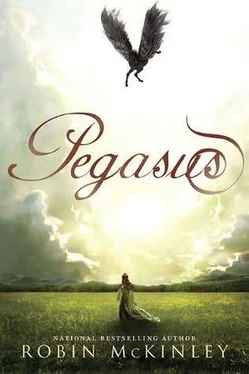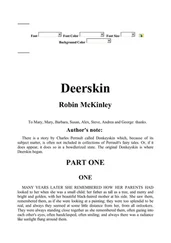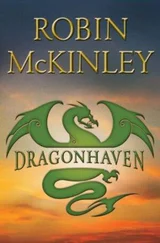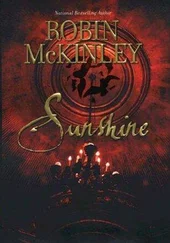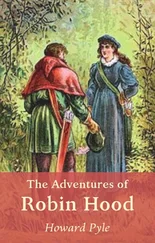She could feel herself drooping. She wasn’t really like her father.
“I’m sorry ... Sylvi,” said Glarfin with an obvious effort.
“Thanks,” said Sylvi, and smiled.“You can call me lady when there’s anyone else around, okay?”
She did ask her father why he hadn’t told her that she had had a special guard assigned to her. Her father looked at her thoughtfully. “I knew you’d figure it out,” he said. “And I hoped that by the time you figured it out, you would be sufficiently accustomed to the situation for the realisation to be less ... dispiriting.”
Sylvi was silent a moment. At last she said, “I wish you’d told me.”
“Next time I will,” said the king. “But you are older now: next time I would have told you anyway.”
“Next time?” said Sylvi.
“There’s always a next time,” said the king, “unfortunately. You just don’t know what it’s going to be about.”
And she asked Diamon if she could have Lucretia as a sparring partner—occasionally.
“She’ll knock you down,” said Diamon. “She’s not one to pull her punches, our Lucretia.”
“I know,” said Sylvi. “But she could show me how she did it after, couldn’t she?”
She had been assigned to the development of the river network in the Kish Mountains as her special project, and so she knew that potential locations of wheels and dams were dependent as much on their defensibility as on the geography of the rivers: because there were taralians in the Kishes—and, lately, there were also norindours. There had always been a few taralians in the Kishes, which also bordered on the wild lands, but she’d been present when one of the engineers reported to Danacor that it was the worst season for taralians he’d ever seen, and he’d been working in and around the Kishes for forty years, man and boy.
“And now a ladon,” he said, and shook his head. Riss lay in the foothills of the Kishes.“Damned snaky basilisk things,” he said. “They make taralians look like housecats. Nearly.”
Bridges, dams and water-power was interesting work—she didn’t mind being good at maths when she could use it for something—and she enjoyed trying to negotiate with water and rock. She didn’t like worrying about taralians.
To everyone’s surprise but her father’s, Sylvi was able to make suggestions about how the village witches might be included in the planning and the defences: several of her best interviewees about village magic were from the Kishes. The engineers blinked at the idea of asking a local wart-charmer and love-potion-mixer for advice about choosing wood and stone most likely to resist interference—a ladon in a temper might well be able to pull a bridge down—but Sylvi would bet on old Marigale or young Vant’s knowledge of their own neighbourhoods, perhaps even against a ladon, and said so. Firmly. The engineer, Sasko, who had said that it was the worst year for taralians he’d ever seen, smiled faintly and said, “You are very like your father, lady. I know Marigale. I will ask.”
She wondered what the pegasi thought about the increasing numbers of sightings of their old enemies in the human lowlands. It seemed to her that Lrrianay never went home any more—that he was always standing by her father’s chair at council now. She didn’t talk to Ebon about taralians and norindours and ladons, or about the rivers of the Kish Mountains—or about the flickering Sword. And he didn’t tell her what he did when they weren’t together—and she didn’t ask. She had discovered that talking to Ebon seemed to happen in the busy, front part of her mind. It was hard to keep anything she was excited about from him, but something she didn’t want to think about was easy to keep to herself. She assumed it was the same for him—but she didn’t ask that either.
She and Ebon ran away from it all as much as they could. They went flying.
It bothered them both, being deliberately disobedient: once, that first night, after their binding, was an adventure; as a habit it felt bad and wrong and sad. But it also felt bad and wrong and sad that they had been forbidden to do something both felt was bred into them, bone and blood: like forbidding a fleethound from running, or a hawk from stooping on its prey. Sylvi didn’t know why it should feel urgent or imperative to Ebon—and had begun by assuming, desolately, that it didn’t. But by the time she had scraped enough courage together to ask him (braced for him to say that actually it was rather a burden, whereupon she would have to refuse ever to go flying with him again), she knew him well enough to know that he was telling her the truth when he said flying with her was a whole other thing—a whole new thing—that he wouldn’t miss it for anything.
She would have been happy to leave it there. That she didn’t have to stop flying was the next best thing that had ever happened to her—the best thing after Ebon himself—even better than having gone flying in the first place.
But he was still trying to explain something. I don’t see the stuff you see. I— He paused, whirled his ears, flattened his nose, hunched one wing, and said, You’re going to make me the greatest sculptor who ever lived—or at least the oddest. Because of the stuff you see—because of talking to you about it. No pegasus sees ... sees the relationshipsof things the way you do. We can build an arch with a keystone—but we could never have built the palace. And that’s not about strength, it’s about seeing. All those walls leaning on each other, stacked on each other.... And those funny little landscape thingummies that are all over the palace—they’re—they’re . . . they’re stranger than you are, you humans.
Of course you don’t understand them, said Sylvi. You don’t have to think about it—what things look like from overhead. You can fly. We think about it too much because—because you can fly.
Okay. But if you flew and we didn’t, we wouldn’t make the thingummies.
Perhaps the difference began in the way they smiled. Ebon said it wasn’t only himself among the pegasi who found that meat-eating humans choosing to bare their teeth when they smiled made you wonder what their real motives were.
I can’t help it! said Sylvi. I smile like that because that’s what my mouth does!
Sylvi had tried to feel the Alliance as she felt the binding between her and Ebon, or as she felt her love for her parents and her brothers—or the slightly anxious deferential respect she felt for Ahathin or Diamon, or even the nameless connection she felt for her land and her people: the sense of something crucially there , not only all around her but in her, even when it maddened or frustrated her (as her brothers often did). But she didn’t. She never had. It hadn’t bothered her before she met Ebon: the pegasi were part of the background of life in the palace, part of the general seethe of motion and urgency—as real, or as unreal, as the crowned pegasus on the royal banner, or the mural of Fralialal. But the real pegasi flew. Every thought about them began and ended there: they were beautiful and strange—and intimidating—they were the symbol of Balsinland’s existence—and they flew .
Danacor hadn’t agreed with the intimidating, but Garren had.“Oh, minikin, you’re so right. Lrrianay isn’t so bad, but that gang that comes with him for the big state occasions—Dossaya and Gaaloo and that lot—and Fhwen—especially Fhwen. The way she looks at you.”
Sylvi asked Ebon later, What’s Fhwen like? She’s very ... imposing.
Ebon had laughed his snorty laugh. You mean she looks like a pompous half-wit.
A beautiful pompous half-wit who can fly, Sylvi amended to herself.
Читать дальше
